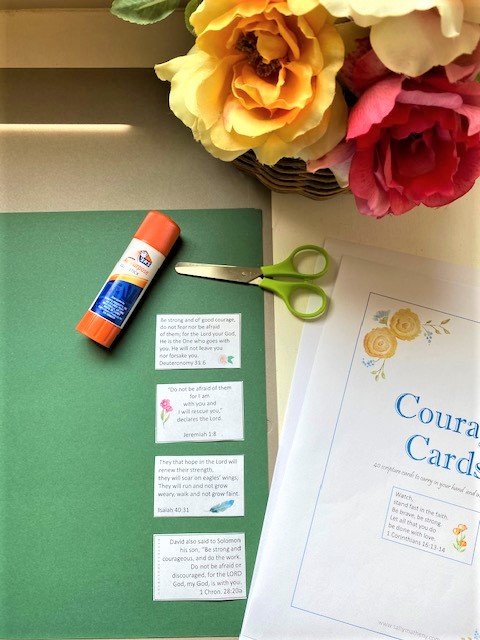
How Do We Tell the Next Generation to Not Live in Fear?
Daily, we hear news of division, destruction, disease, and death. Children hear some form of this as well. Whether it’s via television, the internet, friends, or family. Perhaps they are witnessing it firsthand in their communities, possibly in their own homes. It’s easy to become overwhelmed and discouraged.
So, how do we tell the next generation to not live in fear?
First, it’s important to acknowledge their fears, not ridicule or dismiss them. We need to engage in conversations and listen to what our kids are saying. Sometimes all that is needed to calm a fear is to gently clarify our children’s misunderstanding of something. Other times, it requires much more. For this post, we’ll not focus on specific fears. We’ll focus on how to encourage our children in the midst of fear in general.
A key factor is we, the parents, must learn and practice brave faith-living, so our encouragement is received as genuine. Then, we utilize the power of words.
Use the Power of His Story
When we focus too intensely on the opinions of the world, we tend to become overwhelmed.
Peace will not come until we stop juggling the conflicting stories, and we allow the truth of His Story, God’s Word, to stabilize us.
The accounts of God’s great love and mercy were recorded in the Bible for the benefit of future generations. It’s a living book.
In the Bible, we see Jesus setting the example by using the scriptures and parables to teach those around Him.
The Bible is the greatest resource to use when we are learning and teaching about courage and perseverance. Note that loving God doesn’t mean people never get scared. It’s trusting Him to help us when we do.
Use the biblical accounts of Noah, Joseph, Moses, Joshua, Daniel, David, and so many others to show how God worked through difficult times.
Also, we can use other books and stories to inspire our children, even fictional storybooks. The key is pointing out how God’s Word relates to them.
We don’t have to insert a thirty-minute sermon every time we read or tell a story. (I have been guilty of this!)
But, if our goal is for our kids to grow strong and courageous, then we must remember to insert timely, well-portioned nuggets of God’s Truth into our stories. Those well-placed biblical truths build a ramp pointing our children to a secure foundation in Christ.
Since Jesus is the only one who is able to give true, lasting peace, then shouldn’t our encouragement reflect that?
Use the Power of History
His Story is interwoven throughout our world’s history. A multitude of engaging books provides us with stories of bravery, faith, and determination.
However, our learning from history books can be impaired.
The lessons of history are not easily understood with 100% accuracy, even by the most educated historians. Therefore, it’s wise to teach our children to research multiple viewpoints of a moment in history.
Learning from history is not regurgitating a list of dates and events. History is rich with complexities. We must resist watering information down to simply winners, losers, good, and bad. There were “good guys” and “bad guys” on all sides of events. And the bad guys may have done a few good things, and the good guys most certainly battled sin in their lives.
Primary documents and first-hand witnesses help. But, even then, we must pray for discernment as we glean for wisdom the best we humanly can. Only God knows the exact details of history–especially concerning someone’s true thoughts and motivation.
Which brings us to theological history. In reference to Psalm 78, The MacArthur Study Bible states in a footnote:
If the children learn well the theological interpretation of their nation’s history, hopefully, they would “not be like their fathers.”
The MacArthur Study Bible, page 798
Take a look at what Asaph wrote in Psalm 78.
I will open my mouth in a parable;
I will utter dark sayings of old,
Which we have heard and known,
And our fathers have told us.
We will not conceal them from their children,
But tell to the generation to come the praises of the LORD,
And His strength and His wondrous works that He has done.
Psalm 78:2-4 (NKJV)
Asaph encourages people to use the power of story to teach, comfort, and strengthen the next generation.
He reminds them of the theological history of their ancestors. In this psalm and the one before it, Asaph specifically wants people to remember and pass on the accounts of God’s provision and protection during the Exodus of the Israelites. He also reminds them of God’s judgment and His mercy. All of which are worthy of praise.
When our children become anxious about what is taking place in the world, remind them of how God has taken care of them in the past and of His great love for them.
God sees the whole picture but we’re only able to see a little piece of it. Sometimes He allows trials in our lives to strengthen us and guide us to His greater purpose.

Use the Power of Story
Today, in addition to sharing His Story and the history of the world, we are to share our stories. We need to tell others how God is working in our lives.
Verbally share, but also write experiences down so they can be passed on from generation to generation. Write about the joyful blessings. But, don’t forget to include the trials and the sufferings and how God has carried us through them. Our stories of faith and perseverance may be the ones to encourage another generation to seek His peace.
We use the power of story through our testimonies, but also through inspiring books. Books that help kids face their fears —sometimes, even laugh at them.
Provide wholesome books for your children. By wholesome, I mean books that entertain and educate, but without offending God in the process.
One thing to remember, when we read and talk with our little ones, we must be clear with them about the difference between make-believe and reality.
Have fun! Enjoy the imaginative minds God gave us. But, remember to guard kids’ hearts by not persuading them to place their trust in something that isn’t real. (I’ll write a post expanding on this at a later date.)
Why Do We Need to Tell the Next Generation These Things?
So why should we use the power of story, history, and His Story when we encourage our children and grandchildren?
Psalm 78 commands us to teach our children with this purpose in mind:
That the generation to come might know, even the children yet to be born,
That they may arise and tell them to their children,
That they should put their confidence in God
And not forget the works of God,
But keep His commandments.
Psalm 78:6 NKJV
How do we tell the next generation to not live in fear?
When we sense anxiety rising in our families, we must recall what God has done in the past, tell what He is doing now, and rest in the knowledge that He is faithful to keep His promises.

We’d love for you to have in your resource “toolbelt” the free download of forty Courage Cards – to hold in your hand and your heart. You can access the link in the sidebar. Or, if they are no longer offered there, contact me and I’ll send you the link.
We’d love to hear your thoughts. How are you encouraging the next generation to not live in fear?




